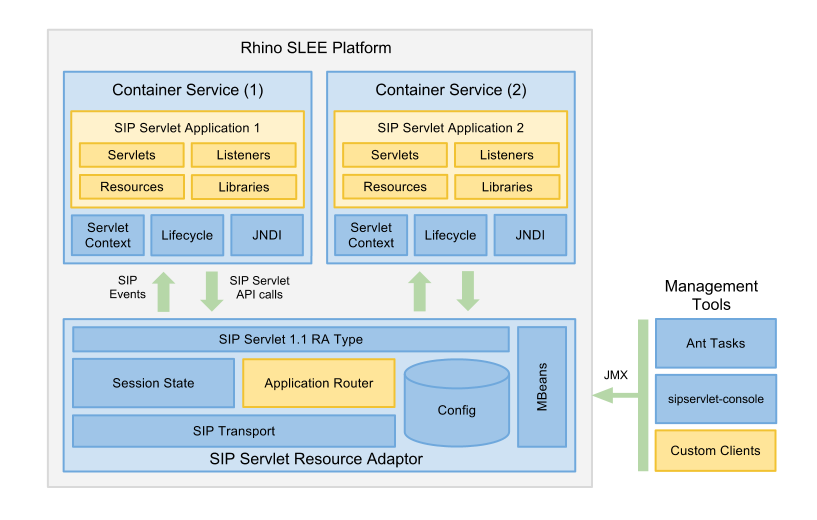Below is a high-level diagram, followed by descriptions, of the main components of Rhino SIP Servlet. Users can provide the items colored yellow, in the SIP Servlet resource adaptor, container services and management tools.

SIP Servlet resource adaptor
The SIP Servlet RA is a SLEE resource adaptor providing the core of the Rhino SIP Servlet platform, including:
-
a SIP transport layer for communicating with other SIP nodes on the network
-
mapping of SIP network messages to and from the SIP Servlet API’s
SipServletRequestandSipServletResponse -
application selection using the Application Router component
-
Proxy,SipSession, andSipApplicationSessionimplementation -
management interfaces (MBeans) for configuration and deployment.
The RA implements a SLEE resource adaptor type (RA type) that wraps the SIP Servlet 1.1 API. The RA type defines the events and activities that may be used by SLEE services. The SIP Servlet Container Service uses the SIP Servlet RA type when it wraps a servlet application (as described below), but may also be used directly by native SLEE applications. See SIP Servlet 1.1 Resource Adaptor Type and Hybrid Applications.
Container services
The SIP Servlet Container Service is a SLEE service that wraps a SIP Servlet application, for deployment into the SLEE platform. When a SIP Servlet application is deployed, Rhino SIP Servlet generates a new container service that contains the SIP Servlet application, and deploys it in the SLEE. The diagram above shows two services, each of which represents a separate SIP Servlet application.
The container service is responsible for providing the runtime environment required by a servlet application. It manages the ServletContext and servlet lifecycle, so is responsible for creating and destroying the servlet application’s servlet and listener instances. The service will invoke the appropriate servlet methods when certain events are received from the RA, such as SIP requests or responses, ServletTimer events, SipApplicationSession, or SipSession events.
|
|
The container services and SIP Servlet RA cooperate to provide a complete SIP Servlet 1.1 environment for servlet applications. |
Management tools
You manage Rhino SIP Servlet using JMX MBeans. The distribution includes console commands and Ant tasks for installing and uninstalling servlet applications, and configuring the platform. See the Installation and Administration Guide for details.
|
|
Limitation: converged container support
SIP Servlet 1.1 allows "converged containers" — servlet containers that support SIP and HTTP servlets within the same application. Rhino SIP Servlet is not a converged container, it currently only supports SIP servlets. |
